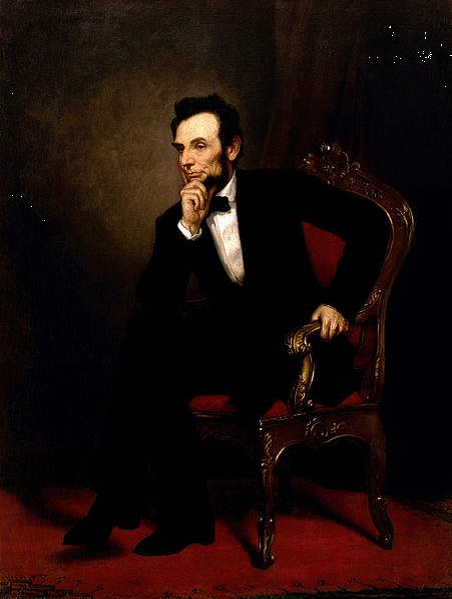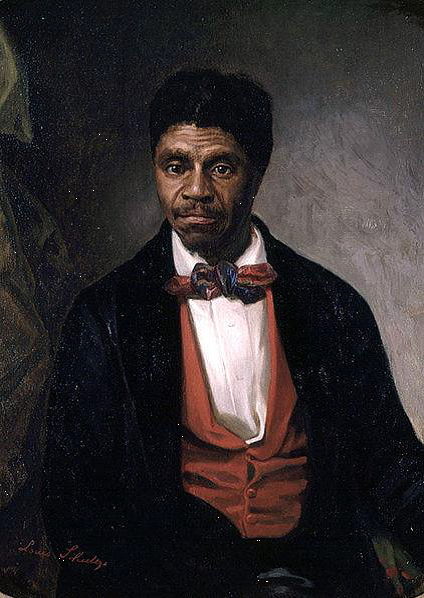[precontent]
[one_third]
Unit 28: Foreshadowing the Civil War
[/one_third]
[two_third_last]

[/two_third_last]
[/precontent]
[three_fourth]
[box]
[box_header]
Unit 28 [flag bg_color=”#d6e3bc” text_color=”#9d241a”]High School[/flag]
[/box_header]
[box_content]
Unit Overview
- Subjects Covered
- Grammar, Literature, Composition, History
- Time Period
- Reformation and Revolutions
- Grade Level
- High School: 9 – 12
- Civilization
- English and American
- Literature
- Frankenstein – by Mary Shelley
[/box_content]
[box_content]
 Unit Description
Unit Description
“The six years from 1853-1859 showed that slavery was a disturbing influence that could not be quieted or removed. For the sake of slavery, attempts were made to annex Cuba, the Kansas-Nebraska Bill was passed, rival parties were allowed to wage civil war in Kansas, the Supreme Court tried to establish a new principle in the territories, and Buchanan and his friends attempted to force a proslavery constitution upon the people of Kansas…” – Albert Bushnell Hart
[/box_content]
[box_content]
Leading Ideas and Biblical Principles
[list type=”arrow”]
- History is HIS Story – God’s story of love, mercy, and redemption through Christ.
- He made known to us the mystery of his will according to his good pleasure, which he purposed in Christ, to be put into effect when the times reach their fulfillment—to bring unity to all things in heaven and on earth under Christ. — Ephesians 1:9-10
- God’s providential hand governs and times all events and provides for His Creation according to His plan and purposes.
- The God who made the world and everything in it is the Lord of heaven and earth and does not live in temples built by human hands. And he is not served by human hands, as if he needed anything. Rather, he himself gives everyone life and breath and everything else. From one man he made all the nations, that they should inhabit the whole earth; and he marked out their appointed times in history and the boundaries of their lands. God did this so that they would seek him and perhaps reach out for him and find him, though he is not far from any one of us.- Acts 17: 24 – 27
- Godly leadership and servanthood are necessary for one to be a true reforming influence.
- Whoever wants to become great among you must be your servant, and whoever wants to be first must be your slave—just as the Son of Man did not come to be served, but to serve, and to give his life as a ransom for many..- Matthew 20:26 – 28
- God raises up and removes leaders.
- He changes times and seasons; he deposes kings and raises up others. He gives wisdom to the wise and knowledge to the discerning..- Daniel 2:21
[/list]
[/box_content]
[/box]
[box]
[box_header]
Unit 28 Resources: [flag bg_color=”#d6e3bc” text_color=”#9d241a”]High School[/flag]
[/box_header]
[box_content]
[button id=”1″ link=”https://www.artioshcs.com/wp-content/uploads/2014/03/Early-Mod-Unit-28-HS-Foreshadowing-the-Civil-War-PRINT-26-WWW.pdf” linking=”new-window” size=”medium” type=”simple” title=”unit”]Download Unit[/button]
[button id=”1″ class=”1″ link=”http://upload.wikimedia.org/wikipedia/commons/thumb/3/38/Viajes_de_colon_en.svg/800px-Viajes_de_colon_en.svg.png” linking=”new-window” size=”medium” type=”simple” title=”maps”]Download Maps[/button]
[button id=”1″ link=”http://www.phschool.com/atschool/ahon/history_interactive/mvl-1021/common_player.html” linking=”new-window” size=”medium” type=”simple” title=”maps”]Interactive Map[/button]
[tabs type=”simple” position=”top-left”]
[tab_title]Lesson 1: History[/tab_title]
[tab_content]
Lesson One Assignments:
- Review the discussion questions and vocabulary, then read the article: Foreshadowing of Civil War, pages 6-14.
- Narrate about today’s reading using the appropriate notebook page. Be sure to answer the discussion questions and include key people, events, and dates within the narration.
- Define the vocabulary words in the context of the reading and put the word and its definition in the vocabulary section of your history notebook.
- Be sure to visit www.ArtiosHCS.com for additional resources.
Lesson One Discussion Questions:
- What was the objection to abolishing slavery in the District of Columbia?
- Why did President Pierce want to annex Cuba?
- Why did the Mormons go to Utah?
- Did the Compromise of 1850 set aside the Missouri Act of 1820?
- Describe the “Know-nothing” party.
- Why wasn’t Seward nominated by the Republicans in 1856?
- Why did Lincoln compel Douglas to announce his Freeport Doctrine?
- How did the Freeport Doctrine conflict with the Dred Scott decision?
- Was John Brown justified in inciting a slave insurrection?
- What were the propositions to reopen the slave trade in the fifties?
- Who put forth the principle of popular sovereignty?
- Describe the principle of popular sovereignty.
- Why did the Kansas-Nebraska Bill pass the Senate?
- Was John Brown justified in killing the Shermans and Doyles?
- Describe a railroad journey in the 1850’s.
- What was the outcome of John Brown’s trial?
[/tab_content]
[tab_title]Lesson 2: History[/tab_title]
[tab_content]
Lesson Two Assignments:
- Review the discussion questions, then read the article: Results of the Mexican War, pages 15-21.
- Narrate about today’s reading using the appropriate notebook page. Be sure to answer the discussion questions and include key people, events, and dates within the narration.
- Be sure to visit www.ArtiosHCS.com for additional resources.
[/tab_content]
[tab_title]Literature[/tab_title]
[tab_content]
Literature Assignments
- Read the assignment background information on Writing a Literary Analysis.
- Create an outline on one of the following topics:
- ▪ Write a literary analysis analyzing how
Frankenstein
- fits one of these genres: Gothic, Romanticism, Tragedy.
- ▪ Using this quote: “Frightful must it be; for supremely frightful would be the effect of any human endeavour to mock the stupendous mechanism of the Creator of the world. His success would terrify the artist,” analyze how
Frankenstein
- From your outline, write a rough draft of your essay.
- Read your essay aloud and note any corrections that should be made. Write your final draft and use the grading rubric to grade your work.
- can be seen as a warning for modern science.
[/tab_content]
[/tabs]
[/box_content]
[/box]
[box]
[box_content]
[box_header]
Unit 28 Extra Resources: [flag bg_color=”#d6e3bc” text_color=”#9d241a”]High School[/flag]
[/box_header]
[tabs type=”simple” position=”top-left”]
[tab_title]Resources[/tab_title]
[tab_content]
Videos:
Complimentary Resources:
[/tab_content]
[tab_title]Arts[/tab_title]
[tab_content]
Music:
https://youtu.be/EvxS_bJ0yOU
Some Composers:
[/tab_content]
[/tabs]
[/box_content]
[/box]

Leave a Reply
Want to join the discussion?Feel free to contribute!